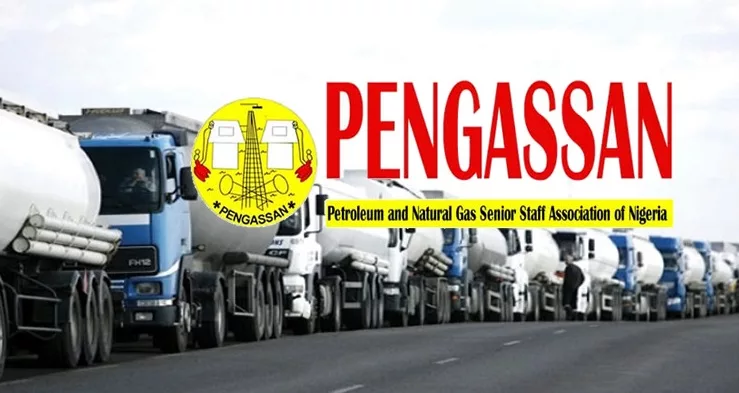The Nigerian National Petroleum Company Limited (NNPC Ltd) has been encouraged by the Petroleum and Natural Gas Senior Staff Association of Nigeria (PENGASSAN) to ensure that the company increases its interest in Dangote Refinery from the existing 7 percent to 45 percent.
PENGASSAN urged the Federal Government to establish strategic petroleum product reserves, saying that doing so will further secure the citizens’ energy security and assurance.
Comrade Festus Osifo, the president of PENGASSAN, made this announcement on Tuesday during a media briefing regarding the association’s communiqué and the conclusions from the third PENGASSAN Energy and Labor Summit (PEARLS 2024), which was held in Lagos. Eyes Of Lagos reports,
In order to preserve the petroleum product storage facilities that are now in place in each of the nation’s six geographic zones, the union also recommended that the government form partnerships with private sector entities.
Petroleum products will be stored there when PENGASSAN is active and will only be made available when there is a shortage.
It maintained that this would help in eliminating the bad roads and severe erosion-imposed perennial shortages that often lead to queues at petrol stations.
The PENGASSAN Secretary-General, Comrade Lumumba Okugbawa, and Osifo jointly issued a communiqué urging the expansion of petroleum product manufacturing domestically.
PENGASSAN further contended that President Bola Tinubu’s elimination of the fuel subsidy on May 29, 2023, was not necessarily the reason for the high cost of petrol at the pump, but rather the naira’s devaluation as a result of floating.
They also mentioned how the devaluation resulted in significant revenue production for parastatals and government organizations alike, as well as for the Federation Allocation Accounts Committee.
“Increasing efforts to get the country’s four refineries operating; the government should divest majority shareholdings and own at most 49% of the shareholding in the four refineries,” was Osifo’s recommendation. The 51% share in NLNG will be taken by core investors, if applicable.
“National pipeline network expansion to facilitate the delivery of refined petroleum products, as this will lessen the strain that trucks transporting these goods place on our roadways.”
Additionally, he demanded that additional compressed natural gas (CNG) infrastructure be installed around the nation, noting that CNG is now the most reasonably priced and environmentally friendly energy source needed to power an automobile in the nation.
Regretfully, this product’s infrastructure is dispersed unevenly throughout the nation. The government should expand the reach of these facilities into every Nigerian city in collaboration with its partners.
“Affordable energy is necessary for energy security to be achieved. The government must make every effort to stabilize the exchange rate in order to guarantee affordability, as Nigerians’ ability to afford electricity will be severely hampered by the Naira’s ongoing decline.
The summit came to the conclusion that Nigeria’s energy mix has not been improved in any significant way. This becomes necessary as it is harder to finance energy related to fossil fuels globally.
“In order to encourage international and indigenous oil and gas companies to invest in increased crude oil production over the next five years, the government should provide more incentives.”
“We should invest 50% of the accruable revenue in renewable energy, such as solar, wind, hydro, hydrogen, and batteries.
Currently, the majority of IOCs are working to create greener energy businesses and strategies worldwide.
On how they could deepen and accelerate this in the Nigerian market, the Nigerian government must collaborate with them, he stated.
He said that this will establish the direction of policy and serve as the starting point for discussions with organizations and interested parties that want to make investments in alternative energy sources.
Osifo noted that IOCs had already entered into contracts for the advance sale of their crude and stated that they would not be required to furnish the Dangote Refinery with the crude they had already promised to sell.
“Those companies suggested that Dangote should pay a premium if it wants them to furnish them right away.
Therefore, the initial discussion over the Dangote Refinery and the claim that they weren’t providing the refinery with oil was sparked by the premium issue.
Regarding the NNPC Ltd., it possesses its own crude. The Buhari administration took out a loan from Afreximbank a few years ago. Repayment of the crude was linked to some of the crude.
Dangote ought to have initiated a conversation about crude supply five years prior, to be exact. Six months into production, you don’t start talking about crude supplies.





